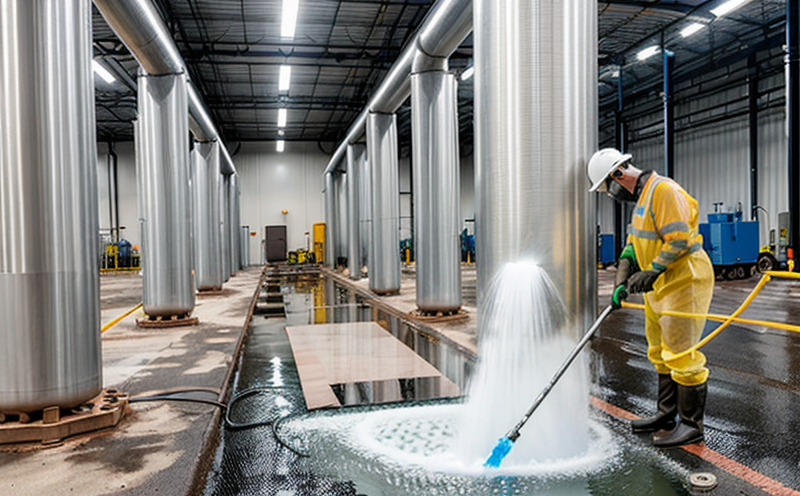Testing the permeation resistance of materials used in industrial applications to prevent chemical leaks or contamination
The Crucial Role of Permeation Resistance Testing in Industrial Applications Preventing Chemical Leaks and Contamination
In todays fast-paced industrial landscape, companies are constantly seeking innovative ways to optimize their operations while maintaining the highest level of safety and compliance. One critical aspect that often goes unnoticed is the testing of materials used in industrial applications to prevent chemical leaks or contamination. At Eurolab, we specialize in providing a comprehensive laboratory service designed specifically for this purpose Testing the permeation resistance of materials used in industrial applications.
The significance of permeation resistance testing cannot be overstated. In the manufacturing sector, chemical leaks and contamination can have catastrophic consequences, resulting in financial losses, reputational damage, and most importantly, harm to human health and the environment. By understanding the permeability characteristics of various materials, companies can identify potential vulnerabilities and mitigate risks associated with chemical exposure.
What is Permeation Resistance Testing?
Permeation resistance testing involves evaluating the ability of a material to prevent the passage of chemicals through it. This laboratory service assesses the susceptibility of a material to chemical diffusion under controlled conditions, providing valuable insights into its permeability characteristics.
Our team at Eurolab employs advanced equipment and techniques to simulate real-world scenarios, ensuring that our clients receive accurate and reliable results. The data obtained from these tests enables companies to make informed decisions regarding material selection, design optimization, and maintenance strategies.
The Advantages of Permeation Resistance Testing
By investing in permeation resistance testing, industrial businesses can reap numerous benefits, including
Enhanced Safety Prevent chemical leaks and contamination incidents, safeguarding employees, the environment, and assets.
Reduced Regulatory Compliance Costs Ensure compliance with industry-specific regulations by verifying material integrity and minimizing potential risks.
Cost Savings Avoid costly repairs, downtime, and replacements associated with compromised materials.
Improved Efficiency Optimize material selection and design to minimize permeability issues, streamlining production processes.
Key Benefits of Permeation Resistance Testing
Our comprehensive laboratory service is tailored to meet the unique needs of various industries. Some key benefits include
Material Verification Validate the suitability of new or existing materials for specific applications.
Design Optimization Identify areas where design improvements can be made to reduce permeability risks.
Maintenance Strategies Develop targeted maintenance schedules based on material-specific requirements.
Compliance with Industry Regulations
In an effort to minimize chemical leaks and contamination, regulatory bodies have established stringent guidelines for industrial operations. Permeation resistance testing plays a vital role in ensuring compliance with these regulations. Our team at Eurolab is well-versed in industry-specific standards and can help clients navigate the complexities of regulatory requirements.
Case Studies Real-World Applications
Eurolab has successfully collaborated with numerous companies across various industries, providing tailored permeation resistance testing solutions that have resulted in significant improvements to their operations
Chemical Plant A leading chemical manufacturer utilized our services to evaluate the permeability characteristics of a new material for their storage tanks. Our findings revealed potential weaknesses, enabling the company to implement design modifications and reduce contamination risks.
Food Processing Facility A food processing plant employed our testing services to assess the suitability of materials used in their packaging systems. Our results identified areas where changes could be made to minimize chemical migration and ensure regulatory compliance.
QA Permeation Resistance Testing at Eurolab
Our team is committed to providing clear, concise answers to your most pressing questions about permeation resistance testing
What types of materials can you test? We evaluate a wide range of materials commonly used in industrial applications, including but not limited to plastics, rubber, coatings, and fabrics.
How do I prepare for testing? Our experts will guide you through the process, ensuring that all necessary documentation and sample requirements are met.
What kind of data can I expect from your testing services? We provide detailed reports outlining permeability characteristics, including diffusion rates and leakage thresholds.
Conclusion
In an era where industrial operations must balance efficiency with safety and compliance, Eurolabs specialized laboratory service offers a vital solution. By investing in permeation resistance testing, companies can identify potential vulnerabilities, optimize material selection, and mitigate risks associated with chemical leaks or contamination.
At Eurolab, our team is dedicated to providing exceptional customer support and expertise, ensuring that our clients receive accurate results and actionable insights to inform their operations. Contact us today to learn more about how our comprehensive laboratory service can benefit your business.




